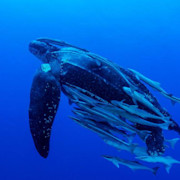- Science News
- Environment
- Scientist at Red Sea Research Center looks at the role of bacteria in 3D coral reefs ecosystems
Scientist at Red Sea Research Center looks at the role of bacteria in 3D coral reefs ecosystems
As a specialist in coral reefs genomics, Christian Voolstra is a Frontiers’ Review Editor for Frontiers in Microbiology and Associate Editor for Frontiers in Marine Science. He is currently an Associate Professor in Marine Science Biological and Environmental Science and Engineering, at King Abdullah University of Science and Technology (KAUST) working from the Red Sea Research Centre, in Thuwal, Saudi Arabia.
“As always you start with something and then a million discoveries originate from that. So I think one of the most exciting things about all this is really this meta-organism concept, namely organisms don’t live in isolation. So the same is true for coral,” said Christian Voolstra during an interview with Frontiers. He continues: “Corals (…) live in a very specific symbiosis with algae that are inside the cell and they found a way to benefit each other, to have energy from photosynthesis and at the same time they live with bacteria,” he explains.
One of Voolstra’s research projects aim at understanding the role of bacteria in 3D coral reefs ecosystems. “I think the common people usually think that bacteria are bad but bacteria are very good,” he says. “In the best sense, of course, [bacteria] would make the organism more resilient towards environmental change. So it’s a very hot topic in coral reef ecosystems.”
Another project is to establish a model system for these corals to help in the research that scientists cannot do in nature. Also, unlike scientists working on rats and human genomics, marine biologists do not have access to already annotated coral genomes, which is the main difficulty in this field. “The level of understanding we gain by the combination of traditional research with this molecular research, I think is really exciting.”








